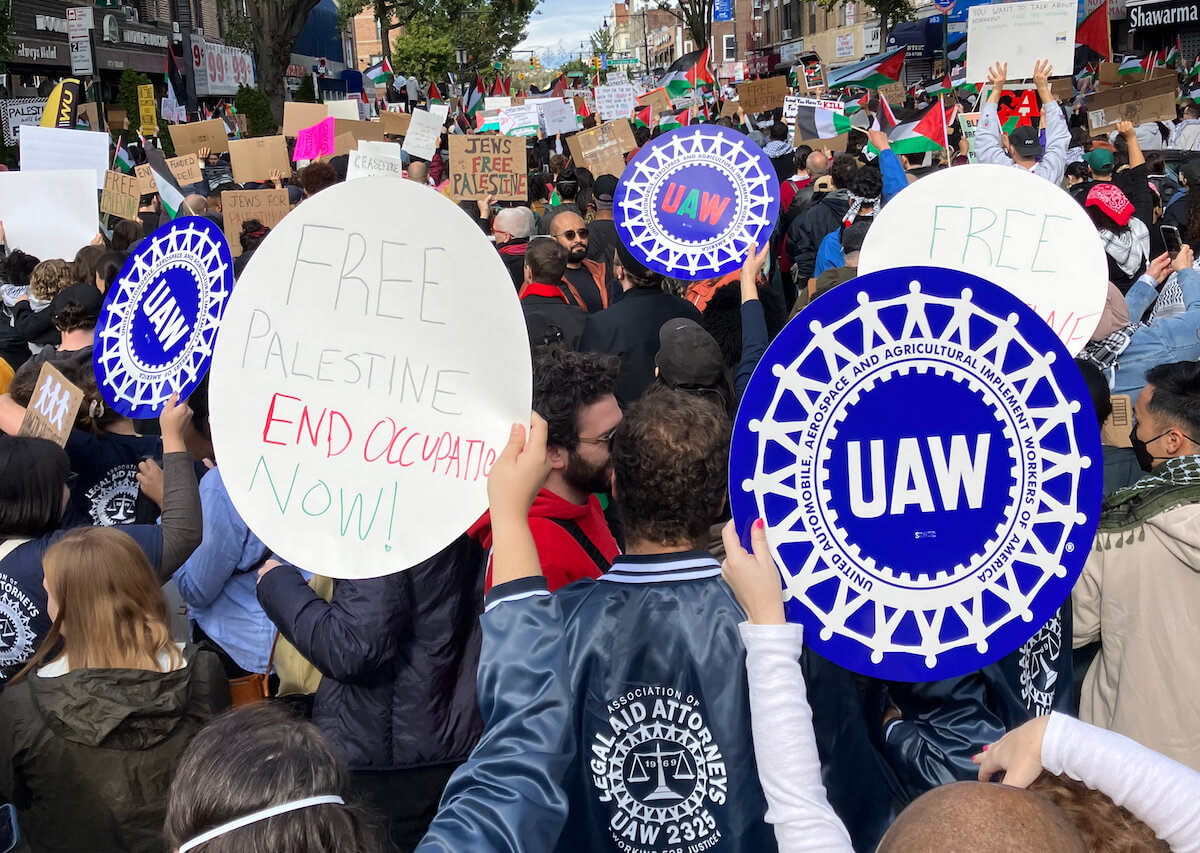MEMBERS OF UAW LABOR FOR PALESTINE MARCHING IN BROOKLYN, DECEMBER 9, 2023. (PHOTO: UAW LABOR FOR PALESTINE)
On December 16, bulldozers—likely manufactured by unionized workers in Caterpillar shops in Illinois—were used to crush Palestinians in Khan Younis. The bulldozers joined scores of other union-made weapons, from precision bombs to military aircraft, killing at least 22,000 Palestinians in under three months.
But even as unionized U.S. employers hold active contracts to produce weapons for Israel, some union leaders have escaped censure and defused rank-and-file anger by paying lip service to pro-Palestine messaging. Our union, United Auto Workers (UAW), for example, has recently become the largest U.S. union to call for a ceasefire in Palestine. To their credit, in taking this action, union leaders responded to immense pressure from rank-and-file workers’ sign on letters, email campaigns, teach-ins, local BDS resolutions, and more. Their ceasefire call only partially fulfills our call to fully adopt BDS and stop arming Israel, but it has led to an immediate array of celebratory articles in the left press, where the UAW has been positioned as labor’s moral compass. In These Times declared that the ceasefire call signaled a “profound shift in the relationship between the labor movement and the movements for…Palestinian rights.” The Nation and Jacobin followed suit.
In the month since its ceasefire call, however, the UAW has taken no concrete steps to stop the production of weapons used to massacre Palestinians. Instead, the union leadership has treated its call for a ceasefire as an endpoint of organizing rather than its beginning. When challenged to materially address the urgent call from Palestinian unions to stop arming Israel, UAW leaders have essentially told members to wait, not act: Wait for the union to create a “Divestment and Just Transition Working Group” that will one day take up these thorny questions; wait for consciousness to grow among UAW workers; wait for our locals to pass ceasefire resolutions. After all, we already called for a ceasefire, the logic goes. The rest can wait.
As a new rank-and-file coalition called UAW Labor for Palestine, we know that organizing to stop the flow of weapons to Israel is challenging. There are scores of weapons workers, not just at factories but also at universities where much STEM fellowship and research support is linked to the weapons production supply chain. Many of these weapons workers are not politicized around the question of Palestine, and even if they were to be, their avenues are limited. Thanks to the dominance of “management rights” clauses in union contracts, workers get no say over how the goods they produce are used, meaning that there is no existing contractual mechanism for workers to refuse to send weapons to Israel. “No strike” clauses further make ceasefire-oriented work stoppages or shop floor actions unprotected.
The difficulty of this work, however, is no excuse in the face of a genocide. Unions in places ranging from Barcelona to Belgium have already managed to take more concrete steps, for example, by refusing to handle weapons on their way to Israel. ILWU dockers on the U.S. West Coast have also honored Block the Boat labor-community picket lines by refusing to handle Israeli Zim Line cargo. Like us, they understand no worker should have to rely on warfare and the terror of empire for job security, but unlike us, they have acted on that knowledge. These examples show us that the obstacles UAW workers face need not scuttle our efforts; instead, the moment calls for decisive action.
Inspired by these models, UAW Labor for Palestine members have taken weapons shop organizing into our own hands, working to realize the ceasefire the UAW has been content to simply call for. A group of us have started going to a Colt factory in Connecticut, which holds a contract to produce guns that are likely to arm West Bank settlers. While individual UAW top brass may be unhappy with this use of union-made weapons, the UAW bureaucracy has only hindered our efforts to change things. At the plant, old-guard union officials have repeatedly filmed us, even threatening us with arrest and resolutely preventing us from starting conversations with their members about the UAW’s own ceasefire call (which many workers have never even heard of). For their part, the UAW electeds behind the ceasefire call have expressed sympathy for our efforts but ultimately warned that they are misguided. Until now, they have refused to use the power of their office to either themselves start organizing or let us organize workers at Colt or other weapons shops toward ceasefire actions.
This commitment to inaction stands in stark contrast with the UAW’s own earlier “Stand Up Strike” campaign this year, in which the newly elected reform union leadership mobilized the union’s significant resources and its vast political and organizing machinery to activate auto workers across the country to demand better living standards. That behemoth nationwide campaign involved months of political education and organizing. The UAW held officially-run tens of meetings at locals across key regions; connected dozens of volunteers to rank-and-file autoworkers; created reams of educational materials; innovated with organizing strategy; held daily livestreams (run by the union president) to inform and agitate workers to strike; placed articles in media outlets; and used its legal and political heft to create pressure. In other words, the union pulled out all the stops, ultimately showing its power when it forced Joe Biden to join a UAW picket line, fully activated thousands of workers as well as public sentiment, and won a majority of the stated goals.
The Stand Up Strike proved that the UAW is a union that can, if it chooses to, “shut it down for Palestine”—in a much more real sense than hundreds of rallies chanting that slogan could do. Daunting as the task might seem, the union has shown that it has the infrastructure, the resources, and the experience to stop the weapons fueling the genocide in Gaza.
If UAW leaders decided to, they could, tomorrow, form a national organizing campaign to educate and mobilize rank-and-file towards the UAW’s own ceasefire and just transition call. They could hold weapons shop town halls in every region; they could connect their small cadre of volunteer organizers—like us—to the people we are so keen to organize with; they could even send some of their staff to help with this work.
If they were even more committed, they could even use the union’s mighty strike fund, its robust legal team, its growing political clout, and its proven prowess at strategic innovation to start materially opposing Israel’s genocide in Gaza. They could assure weapons workers that the UAW will support any and all shopfloor actions in compliance with Palestinian unions’ call to stop arming Israel; they could take the lead in planning such actions, ranging from refusals of overtime to full-fledged shutdowns; and they could connect such efforts to those of university workers doing the research that goes into developing these weapons as well as the logistics workers transporting them.
In short, by acting on its strategic placement across the many weapons shops constituting this country’s perpetual war economy—from universities to factories to warehouses and ports—the UAW could lead the emerging left coalition for Palestine, which too often lacks the kind of concrete leverage unions hold.
Instead, UAW leadership has chosen to take no immediate shop-floor action while being hailed as the leader of the international working class for simply advocating a ceasefire that it has no plan for actualizing—a task the left press has been all too eager to assist them in accomplishing, with reporters already starting to chronicle UAW leaders in the “great man” genre of coverage rather than focusing on the ceasefire organizing work happening in defiance of such leaders’ injunctions to do nothing.
As the genocide against Palestinians grinds on, we hope that the UAW leadership answers the question “which side they you on” with the decisiveness that this moment calls for. When they are ready to start doing the work, they will find us at the factory gates.














